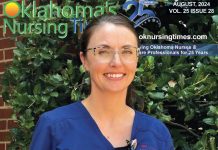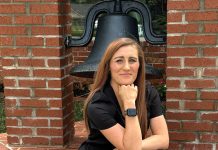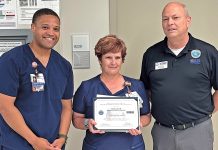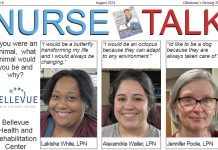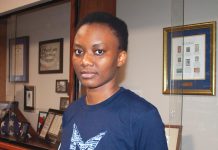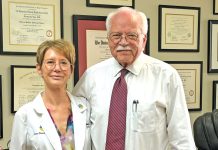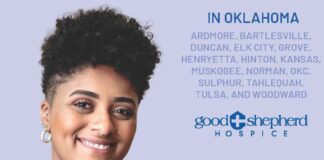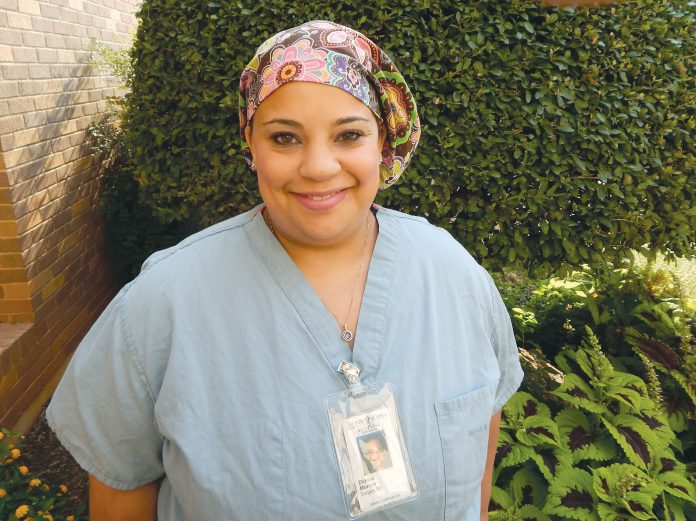
by James Coburn – Writer/Photographer
Dionne Morton had worked for an orthopedic surgeon when she was a CNA and medical assistant.
“I’ve always loved orthopedics,” said Morton, RN, Bone and Joint Hospital at St. Anthony. “Bones and total joints just get better when you operate on them.”
She always wants her patients to do better, she said. And, with orthopedics, they do.
Morton became a registered nurse eight years ago after graduating from Oklahoma City Community College. Always an employee of St, Anthony Hospital, she joined St. Anthony in midtown Oklahoma City and came to Bone & Joint about six years ago, where she works as a circulator in the operating room.
At St. Anthony, Morton served as an ICU nurse and refined her skills.
On a typical day, Morton arrives at work before 7 a.m., looks at the surgery board to find out what surgeon she will be working with that day on a particular case. Then she will go to meet her patients and their family.
Sometimes she will help prepare them for surgery, start their IV, gather their medications and discuss their procedure with them. They learn what to expect when going to the operating room and once they wake up.
“I continue to do that for each and every patient that I have,” she said. “I call the family once we’ve started the procedure in the operating room to let them know how they’re doing and how much longer they can expect us to be back there.”
She takes them to recovery and is with the patient when they open their eyes. Her patients are always surprised.
“I don’t remember going to sleep. Are we already done?,” her patients will say.
Morton attends a lot of surgeries including everything from trauma, close reduction for children (setting a fractured bone without surgery), to attending total joint replacements.
“There’s not a nurse I work with that’s not willing to help,” Morton said. “If you get into a really sticky situation, there’s always someone I can count on who it going to help. They are very positive. They all love their job and it’s a privilege to work with them.”
Bone & Joint nurses are able to critically think. They are at the side to help with anesthesia. So if something needs immediate attention, the nurses need to be able to handle what the anesthesiologist orders.
“They need to follow directions and be able to anticipate the surgery needs,” she said. “And you need to be able to pick up the pieces if something is not going well, and they’ve changed procedures and are doing something different. Then you need to anticipate the next step. You need to be able to listen carefully and give directions as well for the next room.”
“You have to be kind of light-hearted and have a good sense of humor. You have to really love orthopedics in order to be able to do it because it can be kind of testy.”
Patients will often talk about how they injured themselves, such as walking up some stairs and breaking their ankle. Others injure their knees while skiing. There’s always a story with orthopedic patients.
St. Anthony is a Catholic hospital and exceeds in taking care of patients, Morton said. A Catholic hospital or a Christian hospital in general is something Morton has always wanted to work in, she said.
“You can tell there’s Christians and there’s people that care about you,” she said.
Morton takes care of herself as well. She has two young boys and a husband who spend a lot of time traveling or going to the park. She likes to spend as much time with her sons as possible.
“So we do fun days at the park or go swimming, just anything fun that I can do with them,” Morton said.
Her family will often run to her if they’ve hurt themselves. She is their at-home practitioner, she said.
“I’ve gone as far as ask surgeons, ‘”What is this? or, “What can I do?’” she said. “They’re very helpful all the time.”
At day’s end, her life comes together and makes sense. Some of that is because she makes a difference to her patients.
“If it’s a smile I get at the end of a case or a calming that I can have on them during the procedure,” Morton said. “I want to make a difference. I want my patients to be able to remember me.”



